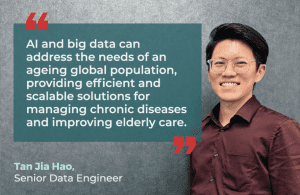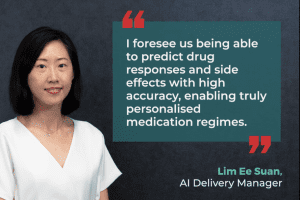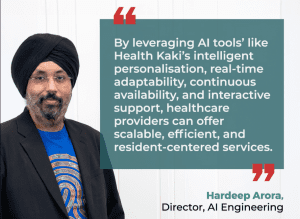Tan Jia Hao, Senior Data Engineer

The adoption of AI and data technologies has the potential to revolutionise healthcare research, patient care, and operational efficiency. With advancements in technology, we can now collect and analyse vast amounts of data, far beyond what humans can manage, to develop personalised healthcare solutions for the world’s 8.2 billion population using tools like large language models (LLMs) and Spark. Prioritising AI and data technologies offers key benefits, including the interpretation of unstructured data, aiding in drug discovery and precision medicine. These systems can also streamline administrative tasks, improve diagnostic accuracy, and enhance patient outcomes by leveraging predictive analytics and real-time data processing. For example, Stanford Medicine’s AI model predicted patient deterioration 6 hours earlier than traditional methods, and Google Health’s AI system outperformed radiologists in detecting breast cancer from mammograms. These technologies are particularly beneficial for remote monitoring and telemedicine, which is vital in today’s healthcare landscape, especially post-COVID. Furthermore, AI and big data can address the needs of an ageing global population, providing efficient and scalable solutions for managing chronic diseases and improving elderly care. However, challenges such as initial implementation costs, data privacy concerns, and staff training requirements must be acknowledged. Navigating regulatory compliance in healthcare can be complex, and while the benefits are significant, organisations must carefully address these challenges to ensure ethical and successful AI and data technology adoption.
AI and data technologies offer immense transformational potential in healthcare. In terms of data management and analysis, data lakes enable efficient storage, access control, and querying of vast unstructured data. Tools like Spark enhance big data processing, which is essential for genomic studies and large-scale health data analysis. The decreasing cost of GPUs also facilitates parallel processing, making advanced computations more accessible. For diagnostics and treatments, multimodal large language models can assist in DICOM image recognition for cancer treatment and predict protein structures from amino acid sequences using tools like AlphaFold. Faster data transmission and efficient compression capabilities allow specialists to perform remote operations, leveraging technologies like 5G and advanced human-machine interfaces (HMIs). These innovations lead to more precise diagnoses, personalised treatments, and improved patient care. However, it’s important to consider limitations and ethical implications. Potential biases in AI algorithms must be identified and mitigated, and human expertise remains vital, especially in complex cases and emotional support. AI should be seen as a tool to enhance human capabilities, not replace healthcare professionals entirely.
AI and data technologies are crucial in scaling digital health solutions across diverse healthcare settings. Containerisation technologies like Docker ensure reliable and predictable deployment of healthcare tools, while Kubernetes dynamically scales these solutions based on demand, ensuring resource efficiency and cost-effectiveness. AI-driven predictive analytics can optimise resource allocation in hospitals, improving operational efficiency. Machine learning models can personalise patient care by analysing large datasets to predict outcomes and recommend treatments. Telehealth platforms powered by AI and big data can extend healthcare access to remote areas, offering 24/7 patient support and appointment scheduling through AI-driven chatbots. Data engineering tools can standardise data formats from various sources like electronic health records (EHRs), wearables, and genomic data. Real-time data processing with AI can also govern data security and compliance. The impact on the healthcare workforce is likely to be significant, with AI augmenting professionals and creating new roles like AI ethics officers and clinical AI specialists. As digital health solutions scale, maintaining a patient-centric approach is essential, ensuring technology enhances care without depersonalising it. Continuous evaluation of AI and data systems’ performance and impact on health outcomes will be vital for responsible scaling across healthcare settings.
Lim Ee Suan, AI Delivery Manager

There is currently a wealth of data available in the healthcare sector. I recently attended AWS Genomics Day and learned that beyond genomics data, there are also proteomics, metabolomics, epigenomics, and transcriptomics data (collectively known as multi-omics data). Each of these provides information on different layers of biological processes and cellular functions.
On the other hand, in the bioinformatics space, 2,012 research papers were published on bioRxiv in the first half of 2024 compared to 1,106 in the first half of 2019, effectively doubling in five years. With the advent of language models fine-tuned on research literature, we’re beginning to unlock new discoveries hidden in vast research data troves.
As we all know, AI is becoming increasingly multimodal, which means it can process and integrate multiple types of data—such as text, images, and numerical information—to generate more comprehensive and accurate insights. Now, imagine the potential of a future multimodal bioinformatics generative model, trained on both omics data and research literature. The possibilities could be transformative.
I foresee us being able to predict drug responses and side effects with high accuracy, enabling truly personalised medication regimes. We might also be able to analyse molecular interactions across diverse diseases and patient profiles and identify new uses for existing drugs. The possibilities are endless.
Hardeep Arora, Director, AI Engineering

Healthcare organisations should adopt AI tools like Health Kaki to deliver personalised care, enhance resident engagement, and improve operational efficiency. Key benefits include:
- Hyper-Personalisation: Health Kaki creates tailored diet and exercise plans that meet individual needs, preferences, and medical requirements.
- 24×7 Availability: Residents can access Health Kaki anytime, ensuring continuous support and flexibility in managing their health.
Health Kaki exemplifies AI’s ability to address current healthcare challenges by offering:
- Customised Health Interventions: Provides personalised health plans that increase resident adherence and lead to better health outcomes.
- On-the-Fly Plan Regeneration: Allows residents to adjust their health plans in totality or specific parts based on real-time changes in lifestyle, preferences, or medical conditions.
- Empowered Wellness: Empowers residents to take control of their wellness with adaptable and responsive health solutions.
Scaling digital health solutions: AI and data are pivotal in scaling solutions like Health Kaki across diverse healthcare settingsw with:
- Seamless Integration: Ensures Health Kaki integrates smoothly with existing platforms, enhancing interoperability.
- Automation of Personalization: Automates the adjustment of health plans, making it easier to scale without increasing administrative burdens.
- Enhanced Accessibility: Expands access to personalized health services for a broader population, including underserved areas.
- Interactive Support: Provides residents with answers to their queries and doubts, supported by cited sources, ensuring reliable and trustworthy information.
By leveraging Health Kaki’s intelligent personalization, real-time adaptability, continuous availability, and interactive support, healthcare providers can offer scalable, efficient, and resident-centered services, ultimately fostering a healthier and more responsive healthcare environment.




